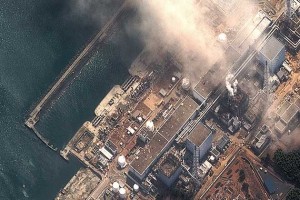
Satellite image of the Fukushima reactor complex. “East,” toward the Pacific is actually oriented toward the top of the image. Photo by DigitalGlobe via Getty Images
There are Ides of all the months, so unless you are Julius Caesar, I would not worry about it this morning. Or Muhamar Qaddafy, but he seems to have kept his self-esteem thing going pretty well, along with his attack helicopters and imported Taureg mercenaries.
I worry a bit about the Libyan rebels, since I have not met them, but certainly wish them well on this day.
I am in a Miami tower, darkness still cloaking the cruise ships at their berths, and there are other plenty of other things to worry about. Public places would be some of them.
Japan is an intensely public place. You know that is why the people of Dai Nippon are the way they are. The public face goes with the public place. This morning, they are worrying about radiation again, and my heart goes out to them. The melting rods of processed uranium are not the catastrophe of the bombs that we dropped on them, nor the hundreds of thousands of tons of conventional explosives that were required to bring the Militarists to heel.
The terms “meltdown” have been thrown around with abandon, and it appears that there are a couple of them in progress right now. The situation is dire, but not so bad as Chernobyl, they tell us, though maybe a little worse than the event at Three Mile Island.
What happened at the Fukushima Daiichi (Number 1) nuclear plant is bad. The reactor is a 1970’s Westinghouse design that requires coolant to be constantly circulated over the power rods.
The flood from the tsunami disabled diesel generators that power emergency cooling systems for five reactors at the plant and a nearby plant known as Fukushima No. 2 (Daini). Without power from the generators, the cooling system pumps cannot circulate cool water around the radioactive fuel rods. As a consequence, the water has boiled off and the fuel rods have melted, which may have caused an explosion and permitted a massive escape of radiation.
Radiation levels have risen to several multiples of annual recommended safety levels. Residents within twenty kilometers of the plant have been advised to lock themselves down and shelter in place.
The commentators are going wild about that, with the predictable results that some are saying that nations with seismic issues- America would be one of them- should not have nuclear plants based on the danger of disruption.
I am not going to worry about it this morning. The reactors that are having problems are ancient in age, and there is better technology that can be much more easily managed in times of crisis. But the relative truth of that will have little influence against the massive emotion caused by a major radiation leak.
We have worried about that, off and on, since 9/11.
The magnitude of the quake is still being registered. The earth’s axis has been changed, ever so slightly; the great island of Honshu has actually moved several feet on the tectonic plate on which it rests. Bizarre.
So, as I prepare to dress in an aloha shirt and linen slacks to descend to the conference to listen to earnest government folks talk about the problems confronting them and their industry suppliers, I am going to be taking surreptitious notes on the impact of the quake on the Japanese economy, and the inclination of Tokyo to continue to purchase US T-bills.
The Japanese are the second largest consumer of the financial instruments, the continued sale of which are propping up the sluggish recovery here.
Things go on because they must go on; plans have been made, and will be executed since it is more trouble to change than go ahead.
But sometimes events can cause the very earth to wobble on its axis.
I will put on my business face here in a second and head downstairs. But in the meantime, pray for speedy resolution of the immediate crisis; swift remediation of the contamination, and if you can, send help to those in need.
I don’t trust those who rush around in the aftermath of tragedy with their hands out, but I gambled on Mercy Corps when Haiti shook itself to pieces.
I will try them again. http://www.mercycorps.org/
Copyright 2011 Vic Socotra
www.vicsocotra.com
